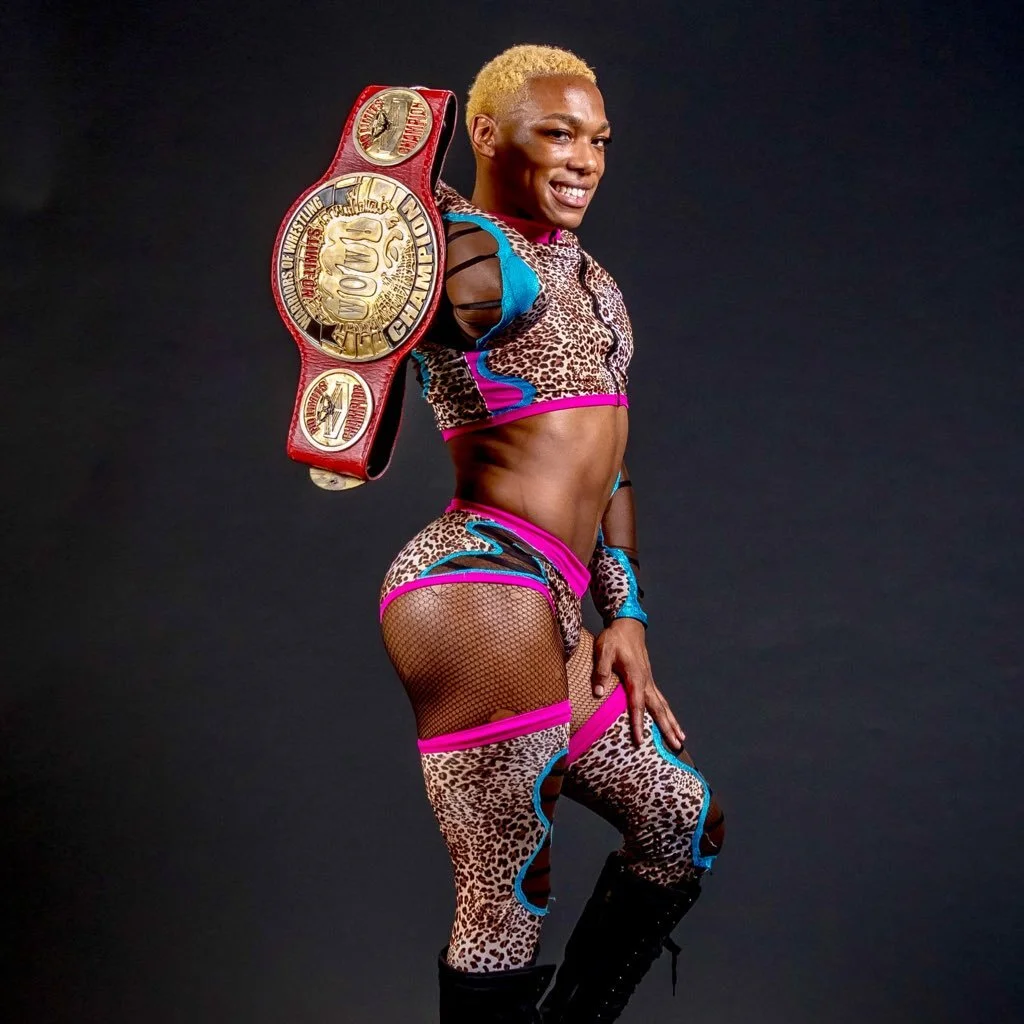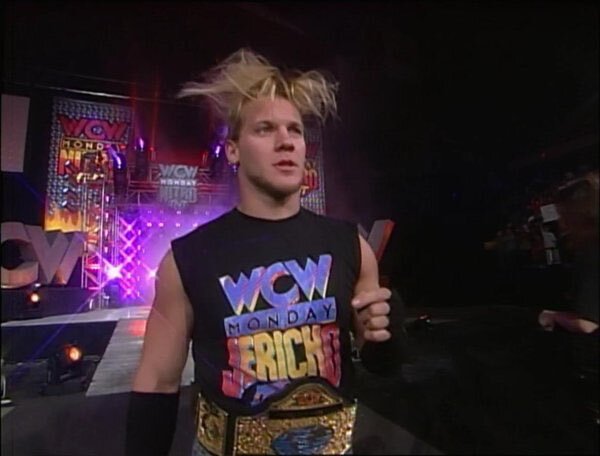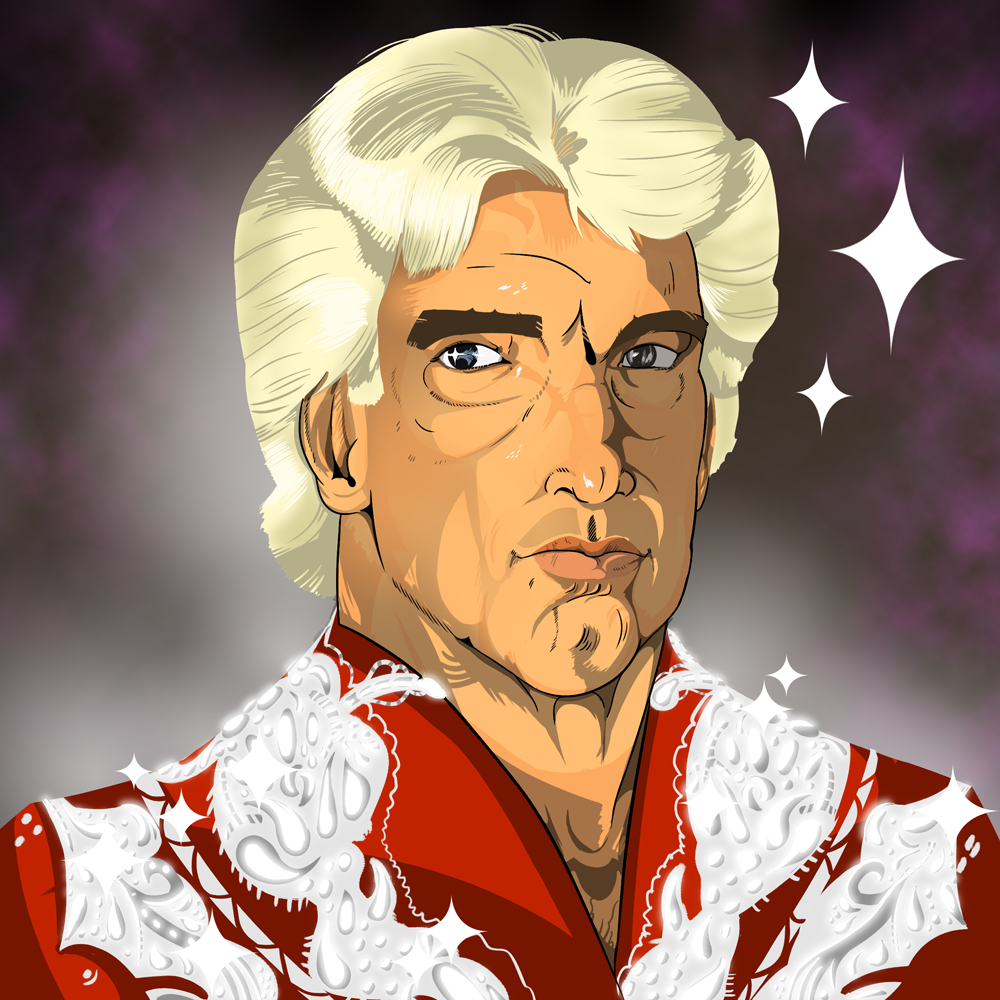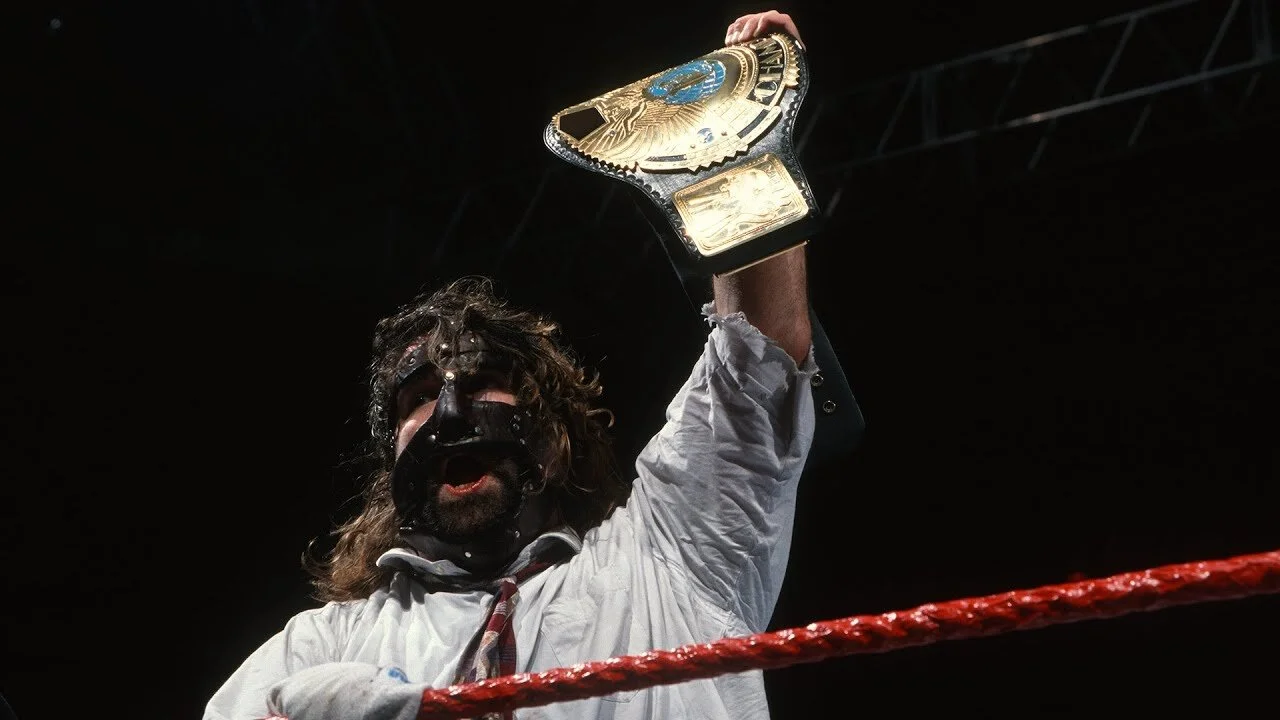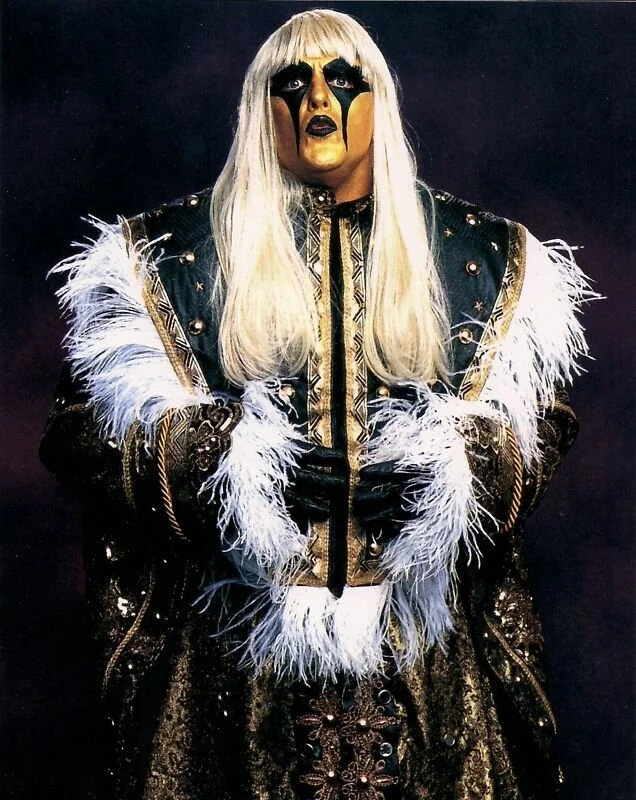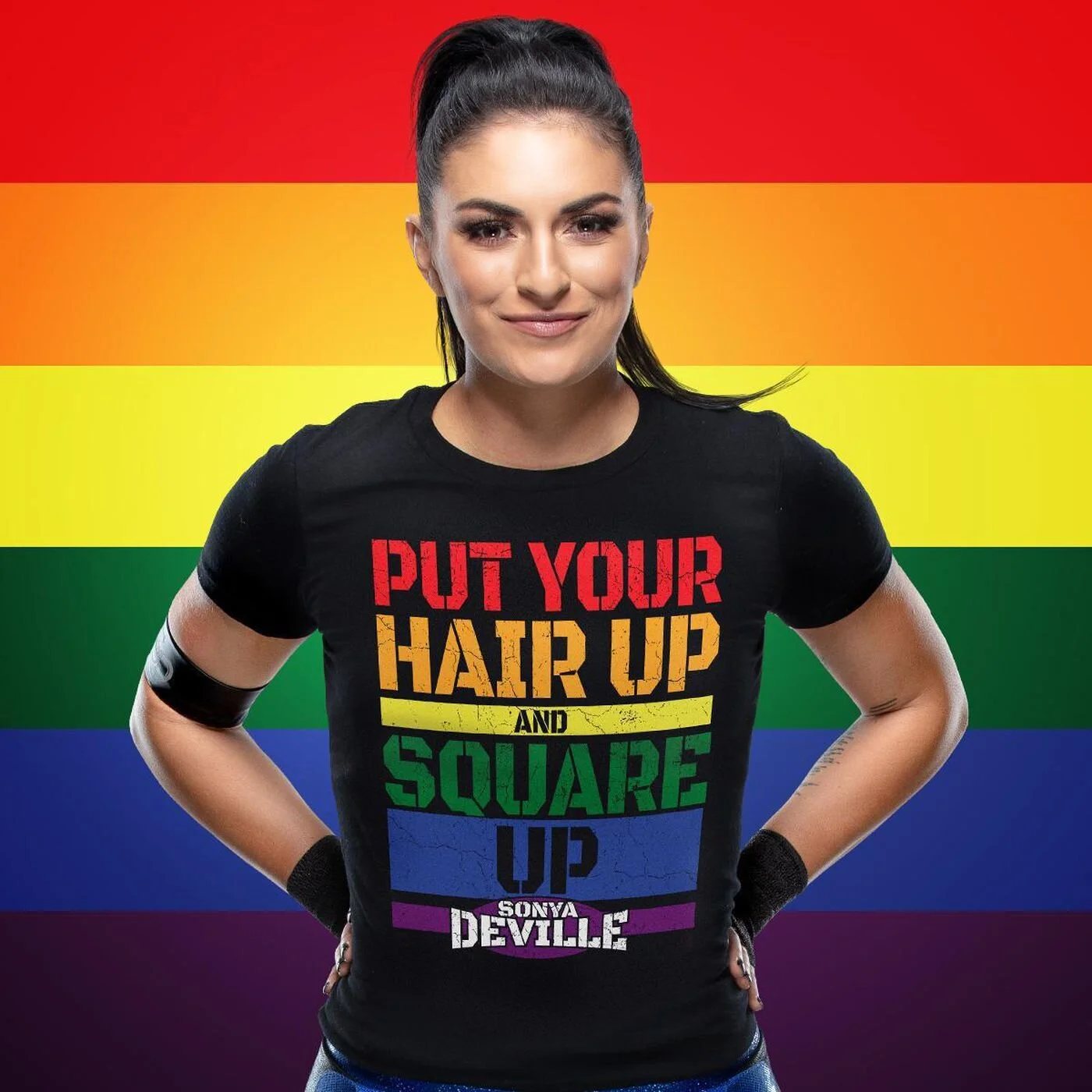How Wrestling Helped Me Understand My Sexuality
Before a black and white TV, in the middle of the night. I'm lying on the floor, I'm bathed in blue light. With the telecast in Spanish, I can understand some. And I need justice in my life.
- The Legend of Chavo Guerrero
There's a lot of stereotypes and misconceptions about the American Southeast, but one adage definitely holds true - it has been, and will always be, a hotbed for professional wrestling.
I had the good fortune to grow up pretty close to the home base of one of the factions of the Monday Night Wars (WCW) and one of the greatest nights of my young life was literally screaming myself hoarse and jumping up and down with my younger brother as we were witness to the all-conquering-killing-machine that was Goldberg tear through that no good bleached-blond menace of “Hollywood” Hogan.
Before me, and though he detested it when I was in my formative years, my Dad actually got to see Andre the Giant come through his small town in Georgia and run roughshod in a battle royal at the high school gym, while my Mom grew up in Louisiana and remembered going with her siblings to watch the Junkyard Dog do battle with the Freebirds in countless scraps. Mom was a lot more supportive of my love of wrestling, as seen by countless merchandise purchases, as well as taking my younger sibling and I both WCW and WWE TV tapings (the realisation that her hunky favourites Kevin Nash and The Rock were at these shows probably helped make an easy sale of going to said live events didn't hit until many years later, but that kind of ties into the whole point of this article).
Now, I did say that there was one adage that holds true about the South, and that was a bit misleading. I have no doubt I might get some pushback from some fellow Southerners on this, but in my personal experience, a great deal of the American South is, shall we say, less than open minded. Especially when it comes to non-heteronormative people.
Why, one of the greatest insults one could hurl at one another at school - which was grounds for bloody fistfights - was to call someone…
*clutch the pearls*
GAY.
And to be perfectly honest, it was a lot more common to hear extremely upsetting gay slurs being casually tossed around - nothing quite like casual homophobia taking the place of “You've got cooties!” “No, you've got cooties!”
To that point, a daily ritual for all four years of my high school existence was to have someone come up to me, call me a gay slur, and slap my textbooks/lunch tray/whatever I might be holding out of my hands, while their friends laughed and cheered.
Being raised in this environment, I was in severe denial about hints that I might not grow up to be exactly like the rest of my family. Despite the wishes of my Dad, I preferred reading and watching old game shows to sports, and had a tendency to cry when I was upset, rather than, I don't know, punch a wall or eat ham, or whatever it is “real” men supposedly do with their feelings. These developing differences were obvious to a great deal of people in my life, including a high school friend (who eventually became my first boyfriend), as well as my Mom - she graced me with the distinction of being the only person I know of to this day who has gotten the “you know I'll love you no matter what/I'm okay if you're gay” speech twice in their life from their Mom.
It was a combination of being raised around a combination of toxic masculinity and (sometimes less than) casual homophobia that left me around the age of 13 convinced of two things in this world:
I was different, but I was not gay.
My sound, pre-teen logic? Why, all I had ever heard of was straight and gay! Gay guys only like guys and since I like girls, I was definitely not gay.
Even though I had started to have occasional daydreams about kissing many different genders, and seeing male celebrities and thinking “he's cute,” I would then angrily yell at myself to stop thinking like that, because it was weird and wrong.
Plus, this was just around the age my Mom started taking us to church a lot and yowie wowie do some Southern Christians have some strong opinions on homosexuality!
Thankfully, my Mom is not a hateful person or bigot of any kind, so she pulled us right out of church when the preacher took to ranting onstage about how all homosexuals were devils and that they would be cast into an eternal fiery pit.
That thing sort of sticks with a young person, though.
So, as you might have deduced from the title to this article, there was an unlikely saviour in my life.
PRO WRESTLING.
For all the faults pro wrestling has - in the best moments of the medium, it is simple, powerful morality tales
I get the irony in the statement of finding an understanding of my queerness via an industry that, during the peak of modern day business in the 1990s, was run by two of the most repugnant examples of top-tier toxic masculinity (Vince McMahon and Eric Bischoff, Table for Two), who put on display the most chiseled of physiques, presented stories of men dealing with their emotions and conflicts through the most brutal and rage-filled forms of retribution possible, and treated LGBTQA+ issues as either a vile act of vulgarity (gay male characters) or being pretty sweet, bro (lesbian female characters).
But hear me out.
When the main examples of masculinity in your life are not the most upstanding gents who seem to always cause more harm than good, you tend to seek out a hero you can believe in. For all the faults pro wrestling has - and they are legion - in the best moments of the medium, it is simple, powerful morality tales that wouldn't have been out of place in a Theatre in the Round.
Good triumphs over Evil.
Joy over Hate.
Audience gets to boo, cheer, and forget their problems, if but for an hour or two.
In my deep rooted fandom of pro wrestling, I found myself seemingly always drawn to the gents who weren't main event level, who didn't have merchandise covered in flames and skulls, who the bullies of my school didn't root for during that brief time where wrestling was the new hotness of the 90s.
No.
I was forever fascinated by those weird ones, the ones who didn't fit the mold of being a muscle suit wrapped around a man & portrayed the height of wit via swearing at an opponent.
The first thing to captivate me in wrestling was the WCW Cruiserweight division- a seemingly separate entity, where actual masked heroes and villains called luchadors flew around the ring in ways my chubby, sickly self could only dream of doing. (Fun fact: this was the first time I imitated something I saw on TV and got in trouble as a result of attempting Eddie Guerrero's frog splash off the armrest of our couch onto the rest of said couch).
As much as I adored the luchadors involved, the one Cruiserweight to really catch my eye was a young, loud-mouthed, long-haired blond guy from a strange land called Winnipeg - “Lionheart” Chris Jericho.
I knew he was a heel, a spoiled brat whose rock star veneer (“COME ON, BAYBAY!”) quickly disappeared the moment things didn't go his way, often leading to tantrums or researching at the Library of Congress to prove there was a WCW conspiracy against him. Also, to see someone who was actually objectively funny (may I direct you to the 1,004 holds Jericho claimed to know?) be treated with respect as a serious combatant (even though he didn't look like a baddie from Teenage Mutant Ninja Turtles) was quite a revelation for me. I knew that his offbeat shenanigans were peak Bad Guy behaviour- but I found him hilarious and utterly captivating, as well as a bit cute.
(I'm a touch disappointed at mid-life crisis booze cruise Jericho, but the man is still entertaining in the ring 30 years later, so bless him on that front.)
Check out our episode #How2RicFlair to learn more about the Nature Boy!
Another heel that, in spite of my “good boy” nature, I became a fan of was “Nature Boy” Ric Flair. The man constantly strutted around like a peacock, proclaiming himself to be the greatest and the best, all while dressing in sequinned robes and preening with so much pomp and camp, he would have fit right in as a villain of the week for Adam West to take on as Batman. Spending a lifetime around “real men” perpetually clad in denim and camouflage while I desired to dress with a bit more pizazz, I found a kindred spirit in the man who crowed about being clad in “a custom made Armani suit, this suit costs more than your house, little man.”
Over on the WWE side of things, while I was of course entertained by the braggadocios Rock, redneck hell-raiser Steve Austin, and the supernatural passion play of Kane and the Undertaker, there was one man who stood head and slumped shoulders above the rest. One who utterly enraptured me in the belief through his successes that anything I wanted to achieve in life was possible, so long as I had enough heart and determination.
That man? Mick Foley.
Be it under the guise of scruffy love child Dude Love, king of the death match and Pyrrhic victories Cactus Jack, or he-who-cannot-be-killed-by-conventional-methods Mankind, Foley was far and away my absolute favourite. Here was a hard working, scrappy family man who just wanted to entertain us huddled masses and live his dreams the only way he knew how - by sacrificing his body and wellbeing in the pursuit of bringing all of us a little bit of joy. I'm not ashamed to admit I had a bit of a happy cry when I watched him win the WWE Heavyweight Championship, and re-watching that moment still makes the hairs on the back of my neck stand up on end. It was one of those lightning in a bottle moments of pure, undiluted happiness, where the fans and fellow wrestlers in the ring were united in adoration and admiration for our beloved underdog in Foley. Outside of Daniel Bryan winning the title at WrestleMania 30, this was the only moment the “You Deserve It!” chant didn't feel a bit cheap and hollow. It was a time all of us who felt on the fringe even within a niche fandom - the losers, the weirdos, the round pegs in square holes - we got to see one of our own reach the mountaintop, and it was marvellous.
Now, were any of these aforementioned favourites anything remotely resembling an LGBTQA+ character?
Of course not!
Again, with the types of people that were in charge of the two major promotions back then, the closest thing to an LGBTQA+ character was the predatory gay caricature - oh, excuse me “androgynous” Goldust. While Dustin Rhodes gave a captivating performance in the bodysuit and face paint, this ain't exactly a shining beacon of representation.
No, what these favourite wrestlers of mine gave me was courage and clarity.
The courage to go out into the world & be who I felt most comfortable being, and the clarity that it was indeed okay to be different; to be a bit loud, to dress with a little more flash, to just be outside of the norm and still succeed.
Even though high school was absolute hell for me, I did find solace in my new friend group of theatre geeks, artsy eccentrics, and the oddballs of the school. Granted, we were all a bit awkward with very niche interests (musicals, anime, 60s TV shows, etc.) But there was strength in the comfort of finding people who truly accepted you as you are, in your shaggy haired, girl-jeans and thrift store button-up wearing weird glory. That friend group was also very gay, and helped me understand about the wonderful world that was the spectrum of sexuality, gender, and gender presentation. Honestly, when I had one of my friends explain to me before our theatre class what bisexuality was, it was like a missing part was finally put back in my head.
So that's what I am!
Not to say it was all smooth sailing from there (hello getting a beer bottle thrown at my head for daring to walk around with pink hair), but I was much happier with myself and in general from those days on.
And I kept watching wrestling.
And I am beyond overjoyed that there's going to be a whole generation of pro wrestling fans who grow up with so much more representation and understanding of different presentations of masculinity and femininity than I had in my youth. Sonya Deville, Nyla Rose, Shayna Baszler, Becky Lynch, EFFY, RJ City, Sonny Kiss - just to name a few - it fills my heart with so much hope. If nothing else, I hope that future wrestling fans, through these amazing performers, can find solace a lot sooner, and feel more welcome by the community as a whole. I know there's still a disgusting mindset about LGBTQA+ that's rampant in a subsection of the wrestling fandom, but thru the work of the aforementioned wrestlers, several indie promotions who are actually using these performers in a prominent manner, and outlets such as the wonderful How2Wrestling podcast (cheap pop but true), the tides are turning against the bigots in the wrestling world.
I am now living on the other side of the country here in the USA and am happily married to a wonderful woman named Ashley who identifies as demisexual; we have actually walked together in our local Pride parade, and I get to spend my days with her and our far too cute and far too mischievous calico named Luna while I work on my writing and watch Ashley paint.
I am a very happy queer man, and I owe part of that happiness to professional wrestling.

